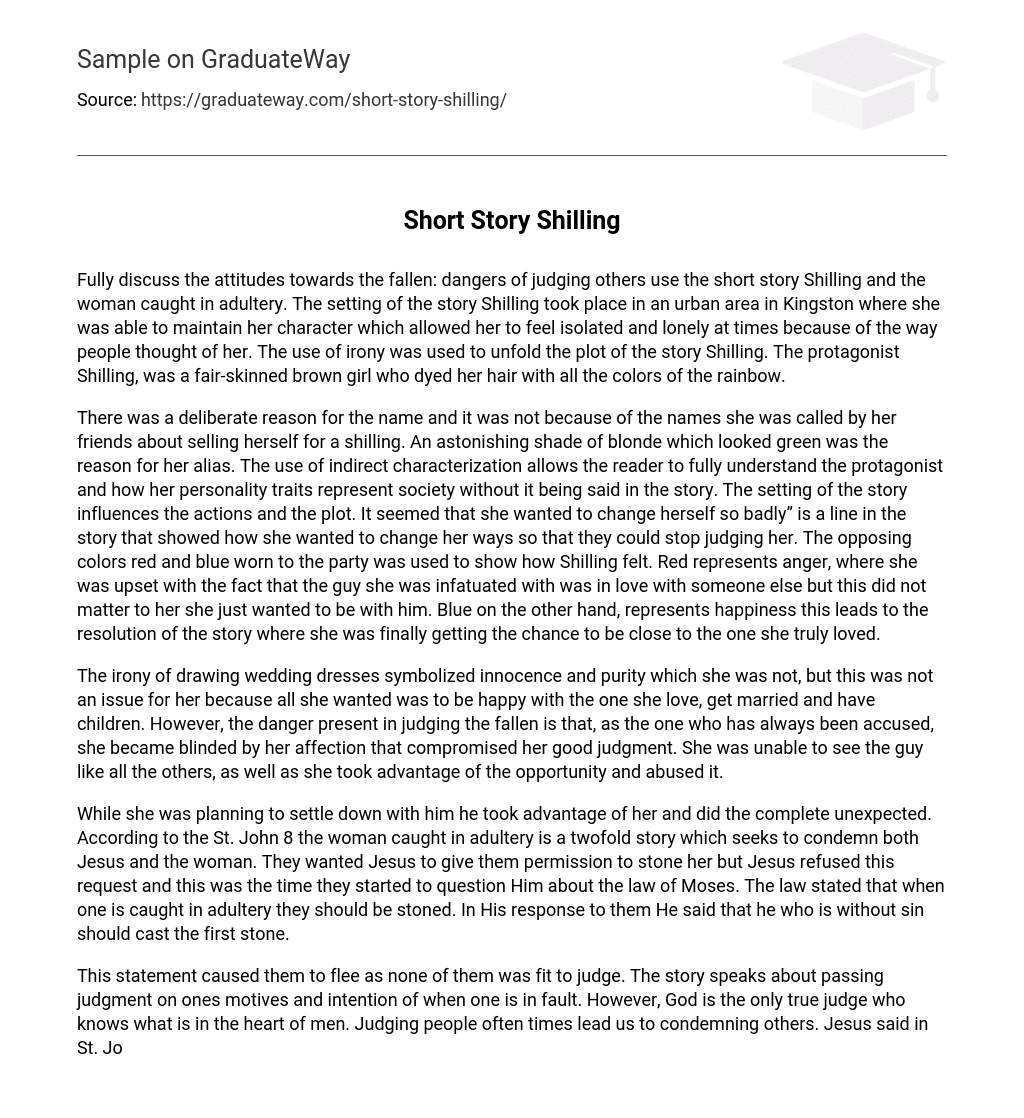Fully discuss the attitudes towards the fallen: dangers of judging others use the short story Shilling and the woman caught in adultery. The setting of the story Shilling took place in an urban area in Kingston where she was able to maintain her character which allowed her to feel isolated and lonely at times because of the way people thought of her. The use of irony was used to unfold the plot of the story Shilling. The protagonist Shilling, was a fair-skinned brown girl who dyed her hair with all the colors of the rainbow.
There was a deliberate reason for the name and it was not because of the names she was called by her friends about selling herself for a shilling. An astonishing shade of blonde which looked green was the reason for her alias. The use of indirect characterization allows the reader to fully understand the protagonist and how her personality traits represent society without it being said in the story. The setting of the story influences the actions and the plot. It seemed that she wanted to change herself so badly” is a line in the story that showed how she wanted to change her ways so that they could stop judging her. The opposing colors red and blue worn to the party was used to show how Shilling felt. Red represents anger, where she was upset with the fact that the guy she was infatuated with was in love with someone else but this did not matter to her she just wanted to be with him. Blue on the other hand, represents happiness this leads to the resolution of the story where she was finally getting the chance to be close to the one she truly loved.
The irony of drawing wedding dresses symbolized innocence and purity which she was not, but this was not an issue for her because all she wanted was to be happy with the one she love, get married and have children. However, the danger present in judging the fallen is that, as the one who has always been accused, she became blinded by her affection that compromised her good judgment. She was unable to see the guy like all the others, as well as she took advantage of the opportunity and abused it.
While she was planning to settle down with him he took advantage of her and did the complete unexpected. According to the St. John 8 the woman caught in adultery is a twofold story which seeks to condemn both Jesus and the woman. They wanted Jesus to give them permission to stone her but Jesus refused this request and this was the time they started to question Him about the law of Moses. The law stated that when one is caught in adultery they should be stoned. In His response to them He said that he who is without sin should cast the first stone.
This statement caused them to flee as none of them was fit to judge. The story speaks about passing judgment on ones motives and intention of when one is in fault. However, God is the only true judge who knows what is in the heart of men. Judging people often times lead us to condemning others. Jesus said in St. John 8:15 and 16 that “Ye judge after my flesh; I judge no man. And if I judge my judgment is true”. This is to say that no matter how we are judged by others who know or flaws in society Gods judgment is the last.
In conclusion about the story shilling and the woman caught in adultery the more exacting our judgment is of others, the more exacting God’s assessment will be of us also the more critical we are of others, the less we see the things that are wrong with us. These are two things that that God offers to us for not being judgmental. As we interact with other people, we must constantly make judgments about their words and actions so that we can respond to them appropriately instead we are prone to look for the worst in people at times, and we judge them more critically than they deserve.
As I discovered, that judging others can put us into embarrassing situations like Jesus did to the Pharisees where not one of them could cast a stone. Judging is a normal and necessary part of life, the bible warns us that we have a natural tendency to judge others in a wrong way. For example, Jesus said “Do not judge, or you too will be judged. For in the same way you judge others, you will be judged, and with the measure you use, it will be measured to you.
Why do you look at the speck of sawdust in your brother’s eye and pay no attention to the plank in your own eye? How can you say to your brother, ‘Let me take the speck out of your eye,’ when all the time there is a plank in your own eye? You hypocrite, first take the plank out of your own eye, and then you will see clearly to remove the speck from your brother’s eye. Matt. 7:1-6. As this passage teaches, when we evaluate and judge other people, our natural inclination is to ignore our own faults and to make critical judgments of others.
Jesus is not forbidding critical thinking in the positive sense, which means to evaluate others’ words and actions carefully so we can discriminate between truth and error, right and wrong. What he is warning us about is our inclination to make critical judgments in the negative sense, which involves looking for others’ faults and, without valid and sufficient reason, forming unfavorable opinions of their qualities, words, actions, or motives. In simple terms, it means looking for the worst in others.





